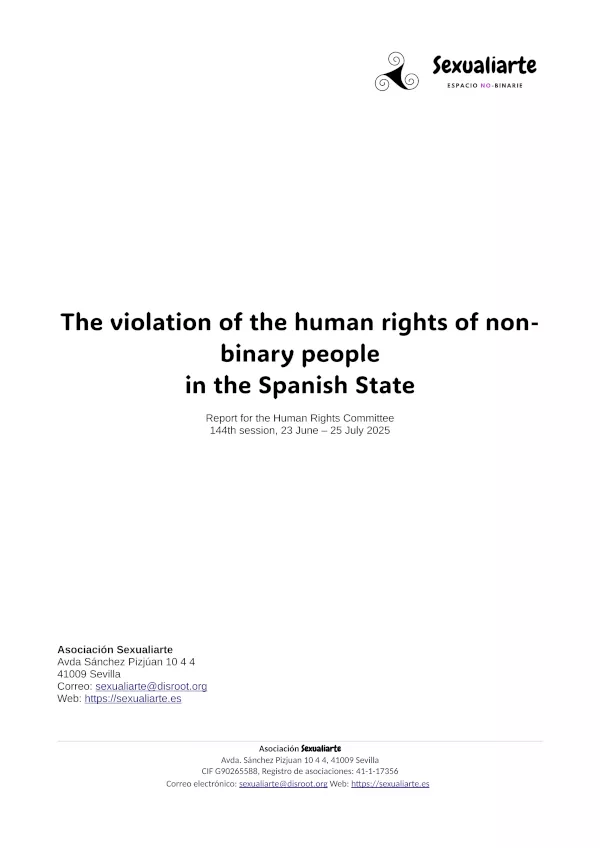
Report for the Human Rights Committee
144th session, 23 June – 25 July 2025
Executive Summary
The Trans and LGTBI Law of 2023, celebrated as an advance towards gender self-determination, left out non-binary identities, thus limiting self-determination to two options, ‘man’ or ‘woman’. Although some Autonomous Communities include the recognition of non-binary identities in their trans or LGTBI laws, this recognition is left to free interpretation and limited to the scope of the respective autonomous administrations. There is no recognition of non-binary identities in identity documents, birth certificates, population registers, or documents of state administrations (Tax Office, Social Security, Civil Registry, etc.). This is even the case for foreigners residing in Spain who have their non-binary identity recognised in their country of origin and in the Registro Central de la Extranjería.
In the case of non-binary people, the mandatory inscription of a non-binary sex/gender on any documentation exposes them to the administration or any person to whom they have to show the documentation (e.g. at a hotel reception), potentially exposing them to discrimination and violence. This is why we think that the best option is to remove gender markers from identity documents, birth certificates and, in general, as part of a person's legal personality, as also required by Principle 31A of the Yogyakarta Principles+10.
The non-recognition of non-binary identities makes it difficult to fight effectively against the multitude of discriminations suffered by non-binary people: in public and leisure spaces, in education, in the health system, in the workplace, which are just some of the aspects of life that can be addressed in this report. As the Spanish State does not recognize non-binary identities, statistics and research on needs, protocols for prevention, awareness and action in the face of violence are not collected and, therefore, awareness and discrimination prevention campaigns are not carried out, leaving us without effective resources to combat discrimination. The Spanish State is thus failing in its duty to protect.
Among the main recommendations we point out the elimination of gender markers from identity documents and the non-registration of sex/gender in the civil registry. As long as these markers are not eliminated or when necessary, we recommend the non-compulsory inclusion of more markers.
We also recommend training and creation of research and campaigns for prevention, awareness and action in the face of the violence we experience, and putting in place protocols in the different areas of life for inclusion and against discrimination; creating mixed and/or private bathrooms in public spaces, sports and educational facilities; and updating health protocols to include in the service portfolio and calendars of notice to diagnostic tests corresponding to the corporality and, if any, to the hormonal process.
Asociación Sexualiarte, May 2025
